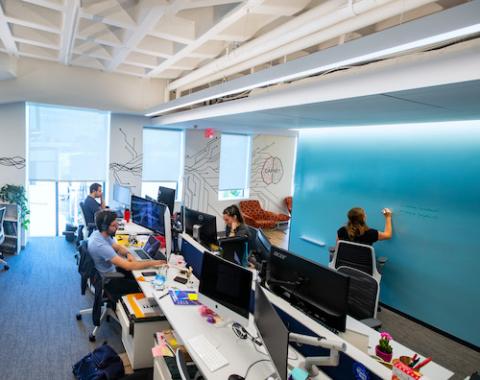Perspective: Igniting the computational flame at Carney

What is computational brain science? The term “computation” is invoked so much these days that one might mistake it for brain science writ large.
Indeed, computation is arguably the function of the nervous system, and much of theoretical neuroscience is devoted to understanding how neurons and circuits “compute” to encode and decode sensory information, to flexibly guide behavioral outputs, and to maximize reward. A different branch of computational brain science deploys computational tools in a data-driven way to analyze complex high dimensional neuroscience datasets. As imaging methods are increasingly refined to produce impressively refined characterization of neural processes, it becomes clear that theories and data reduction methods are needed to provide links between these signals and their functions, and to leverage them to make predictions.
Accordingly, computational brain science is an interdisciplinary field that aims to understand the functions of the brain and mind at all levels — from molecules to cognition — using principles from physics, mathematics, engineering, and computer science while also grounded by the disciplines of biology and psychology. Computational neuroscientists ask questions such as:
- How do neurons communicate information?
- What are the organizational principles in brain and mind that facilitate learning, abstraction and generalization?
- How is information flow disrupted in neurological and psychiatric conditions?
- How can we leverage formal mathematical models to lend insight into these questions?
Last July, we launched a new Center for Computational Brain Science (CCBS) within the Carney Institute to create collaborations between basic brain science researchers and engineers, mathematicians and computer scientists, and to bring computational neuroscience innovations to clinical applications and commercialization. I spearhead the center along with Thomas Serre, the center's associate director. CCBS emanated from the successful “Initiative for Computation in Brain and Mind,” which was launched in 2012.
CCBS faculty members and their labs have particular expertise in computational approaches to higher-order brain function, including computational perception, reinforcement learning, decision making, motor control, and cognitive control. In all of these domains our expertise spans levels from those investigating biophysical mechanisms to those focusing on computational objectives. At the same time, CCBS researchers are world leaders leveraging computation to improve neurotechnology (such as brain-machine interfaces), machine learning approaches to advanced neural data analysis, and computational psychiatry and neurology. While progress in these domains preceded the center, their integration into a coherent community is already catalyzing new collaborations across campus engaging mathematicians, computer scientists, biologists, behavioral economists, engineers, and cognitive neuroscientists. We are very grateful for a recent generous gift to the Carney Institute devoted to enhancing computational brain science, demonstrating commitment to this thriving community.
CCBS hosts a number of events designed to promote community engagement, cross-training and interaction to make the whole greater than the sum of its parts. We host an interactive seminar series, where attendees are encouraged to engage with the external speaker to get into some of the “nitty gritty” questions that might not typically be addressed in classical colloquia. These seminars are available to view by the Brown community on our website. CCBS also co-sponsors the Data Science, Computation & Visualization (DSCoV) lunch series, which provides introductions to basic data science and programming skills and tools.
Each summer, CCBS hosts a more intensive two-week workshop on computational methods for interrogating links between brain and behavior, including quantitative model specification, parameter estimation and validation. The first week combines morning lectures from multiple faculty and postdoctoral fellows with afternoon hands-on coding tutorials. The second week offers attendees the opportunity to put their new skills to the test with a real dataset and a friendly competition that rewards them with creative and innovative approaches which can potentially improve the fits to data beyond models described in the literature. Complementing this modeling workshop and competition, CCBS also hosts occasional hackathons and neurodatathons in which attendees can interrogate neural data, for example by using machine learning methods to discover structure.
Lastly, I am excited about a completely new initiative within CCBS, tentatively titled “Carney BrainStorm,” to accelerate translation of computational brain science to clinical applications and commercialization. Talented computational neuroscience Ph.D. graduates are increasingly being recruited for competitive positions in industry, including at large companies such as Google, Facebook and many artificial intelligence start-up companies. A major objective of CCBS is to capitalize on the momentum and excitement of application-driven computational science to pursue high-risk, high-gain projects in the service of improving brain health. With the help of Carney and generous donors, BrainStorm funds research scientists spanning a range of computational expertise, with a desire to pursue meaningful application projects at the interface between computational neuroscience, machine learning and brain disorders. Examples could include novel methods for detecting neural signatures related to pathology, closed-loop brain stimulation, smartphone apps, and more. We have already hired Frederike Petzschner, an exceptionally talented scientist with expertise in computational psychiatry, to help lead this program. Projects will have intermediate time horizons of three to five years with a high potential for conversion to translational applications, startups and/or scaling up in larger industry endeavors. We plan to collaborate with local Brown University experts on technology transfer and entrepreneurship, and with industry partners. Be on the lookout for more details and official announcements, and sign up for our listserv for the latest CCBS news!
Michael Frank is the Edgar L. Marston Professor of Cognitive, Linguistic and Psychological Sciences at Brown University and the director of the Center for Computational Brain Science at the Carney Institute. His research combines multiple levels of computational modeling and experimental work to understand the neural mechanisms underlying reinforcement learning, decision making and cognitive control.



